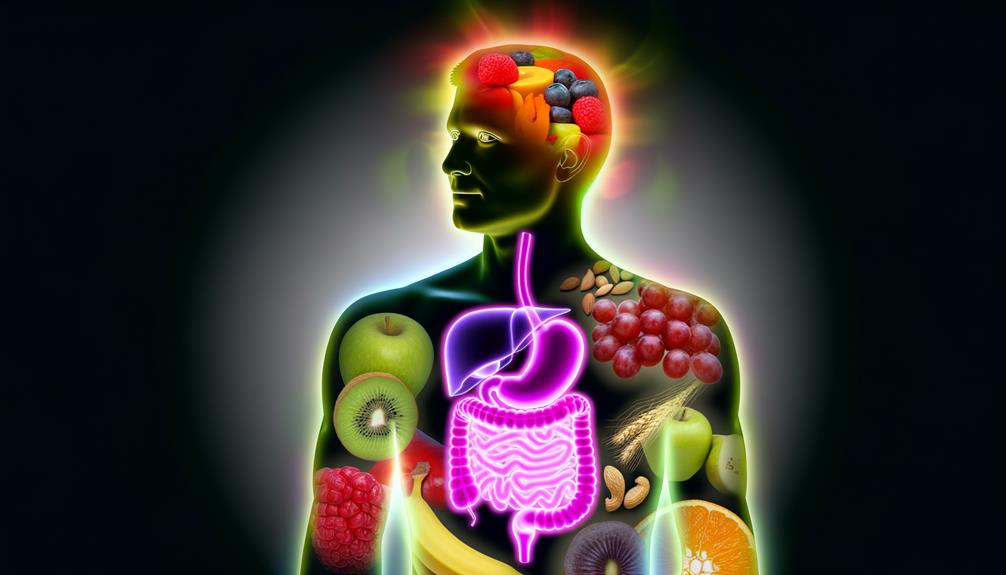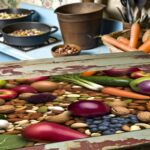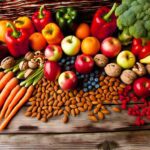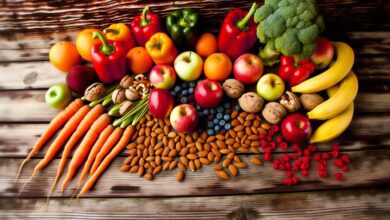Imagine you’re one of the growing number of people who’ve turned to a raw food diet and have begun to experience a marked improvement in your digestive health. By incorporating uncooked fruits, vegetables, nuts, and seeds into your daily routine, you’re not only embracing a cultural shift towards more plant-based eating habits but also optimizing your digestion. Raw foods are inherently rich in enzymes, which are critical for breaking down nutrients, and the high fiber content supports a well-functioning gastrointestinal system. You’ve probably noticed that you’re feeling less bloated and your ‘regularity’ has improved. Yet, there’s a complex synergy at play within your body, with benefits extending beyond these immediate changes. As you continue to explore this lifestyle, you’ll uncover the deeper impacts of a raw food diet on your overall digestive efficiency, but have you considered the full spectrum of how this diet could be fine-tuning your gut health?
Key Takeaways
- Incorporating raw foods into the diet boosts digestive efficiency.
- Raw foods significantly increase the efficiency of nutrient absorption.
- Eating raw foods preserves enzymatic activity essential for digestion and nutrient absorption.
- Raw foods rich in fiber support the complex ecosystem of the gut microbiome.
Enhancing Digestive Efficiency
To boost your body’s digestive efficiency, consider incorporating a raw food diet that leverages natural enzymes to enhance nutrient absorption. These enzymes, present in raw fruits and vegetables, act as digestive aids, breaking down food more effectively than the body can do alone. You’ll find that eating foods with high nutrient content and high water content, as in raw food diets, can facilitate smoother digestion and contribute to increased energy levels.
The magic lies in the natural enzymes found in raw foods. They’re specialized proteins that catalyze chemical reactions within your body, optimizing the breakdown and assimilation of nutrients. By consuming these foods, you’re supplying your system with these crucial helpers, reducing the workload on your digestive organs.
Gradually increase your intake of raw plant-based foods to give your digestive system time to adjust. Introduce fermented vegetables, which are rich in probiotics and enhance gut health, further improving nutrient availability. With this approach, you’re not just eating, you’re nurturing your body with the purest form of nutrients, designed by nature to work in harmony with your physiology.
This way of eating isn’t just about feeding yourself; it’s a path to serving your body with respect and care, leading to a vibrant, healthful life.
Nutrient Absorption Benefits
Building on the digestive advantages of raw foods, you’ll also experience enhanced nutrient absorption, a key to unlocking the full potential of your meals. When you incorporate raw foods into your diet, you’re not just eating for sustenance; you’re optimizing your body’s ability to extract and utilize the bounty of nutrients these foods contain. The vital enzymes present in raw fruits and vegetables significantly increase your digestive system’s efficiency.
Here’s a quick glance at how raw foods boost nutrient absorption:
| Benefit | Description |
|---|---|
| Enzymatic Support | Raw foods are rich in enzymes that aid in breaking down food particles for better nutrient extraction. |
| Gut Health | Fermented veggies introduce probiotics, improving gut flora balance and digestion. |
| Antioxidant Intake | A diet high in raw foods increases the intake of enzymes and antioxidants that protect and nourish your cells. |
Embracing a raw food diet improves not only digestion but also ensures that your body receives more of what it needs to thrive. The health benefits are clear: when your digestion is in top form, you’re better equipped to serve and nourish others, spreading wellness through each meal shared. Remember, every raw bite is a step towards a more vibrant, healthful life.
Enzymatic Activity Preservation
By choosing to eat raw, you’re preserving the precious enzymatic activity that’s essential for optimal digestion and nutrient absorption. When you consume unprocessed foods, particularly raw vegetables, you’re embracing the full spectrum of health benefits they offer. These raw foods come packed with natural enzymes that support Digestion and Nutrient Absorption, ensuring that your body receives the vital nourishment it requires.
It’s important to recognize that the food preparation process can significantly impact the enzymatic activity in your meal. Cooking or heating can denature these helpful enzymes, reducing the overall nutritional value of your foods. Therefore, when you opt for a raw meal or snack, you’re actively choosing enzymatic activity preservation, which is fundamental for your metabolic processes and overall well-being.
Moreover, fermented vegetables like kimchi and sauerkraut are a boon to the raw-food diet, as they enhance digestibility and nutrient availability. These foods provide a synergy of enzymes that further optimize digestion.
Gut Microbiome Support
While preserving enzymes in raw foods aids your digestive process, it’s also crucial to consider how these choices support the complex ecosystem of your gut microbiome. Consuming raw foods rich in fiber, such as vegetables and fruits, provides the necessary substrates for beneficial gut bacteria to thrive.
Embracing a raw food diet can enhance digestion and bolster the health of your gut microbiome, which in turn supports your overall well-being. The live enzymes in raw produce work hand-in-hand with a vibrant gut ecosystem to ensure you’re not just consuming nutrients, but effectively assimilating them. As you serve others and share this knowledge, remember that the shift to a plant-based, raw diet is more than a personal health choice—it’s an investment in a thriving, supportive gut community.
Reducing Digestive Strain
Eating a diet rich in raw plants can significantly reduce the workload on your digestive system, leading to more efficient nutrient uptake and overall digestive health. When you consume vegetables and fruits in their natural state, you’re not only indulging in foods rich in nutrients but also taking advantage of their higher enzymatic content. This is crucial for ensuring optimal nutrient intake and can help you experience improved digestion.
Raw plant foods are generally higher in fiber, a component that aids in moving food through your digestive tract. By consuming these fibrous foods, you’re supporting your body to adjust and maintain a smooth digestive function without overwhelming it. Cooking can degrade the essential enzymes that facilitate digestion, so keeping foods raw helps preserve these elements, reducing the strain on your body’s organs.
Incorporating fermented vegetables, such as kimchi or sauerkraut, into your diet is a thoughtful way to serve your digestive system. These foods enhance nutrient availability, allowing you to absorb more from what you eat. Remember, the microbes in your gut are allies in your journey to health, working alongside digestive enzymes to break down your meals efficiently. Committing to a raw food diet can be a transformative step towards a more harmonious and less taxed digestive system.
Frequently Asked Questions
What Happens to Your Body When You Go on a Raw Food Diet?
When you switch to a raw food diet, you’ll experience enzyme preservation, improved nutrient retention, and beneficial microbial changes. Your gut flora thrives, aiding digestion. You’ll also notice better hydration and toxin reduction.
What Are the Positive Effects of the Raw Food Diet?
You’ll feel like a well-oiled machine with improved gut health, balanced flora, and hormonal regulation. Expect higher energy levels, better weight management, toxin reduction, radiant skin, and an immune boost from enzyme preservation and nutrient retention.
Are Raw Foods Easy to Digest?
You’ll find raw foods are generally easier to digest due to enzyme retention, high fiber content, and nutrient preservation, but consider chewing effort, food temperature, and hydration levels for optimal digestive health.
Does Raw Food Digest Faster Than Cooked Food?
Yes, raw food often digests faster due to enzyme preservation, aiding nutrient absorption. The lack of cooking effects, high fiber content, and natural fermentation process benefit your digestive speed and intestinal microbiota. Chew thoroughly for best results.







